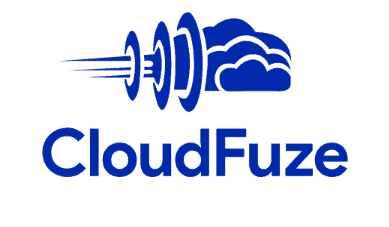CloudFuze Review
With CloudFuze, you can connect over 40 different cloud storage services. However, it's pretty expensive, so keep reading this CloudFuze review to see if it's worth it.
Cloud storage services have changed the way we interact with our data. However, we now use so many of them that we need a separate app to manage multiple cloud storage accounts. CloudFuze is one such cloud-to-cloud management app. In this CloudFuze review, we will dig into this service to see how it works and help you determine if it is the right solution for you.
Key Takeaways:
- CloudFuze is one of the best cloud-to-cloud management services. It supports over 40 leading public cloud storage services.
- The Business payment plan comes without data limits, and you can migrate unlimited terabytes of data on it. CloudFuze doesn’t have a free plan, but it does have a 30-day free trial.
- Because it’s based in the U.S., it complies with United States privacy laws, which can be an issue if you prefer your apps to be more privacy-oriented.
CloudFuze ranks high on our best cloud-to-cloud management software list, due to the fact that it migrates users and files along with their roles and permission levels. However, CloudFuze faces stiff competition from the likes of MultCloud (our MultCloud review explains why) and cloudHQ. Read on to see how it compares to these and if it stands out on its own.
Strengths & Weaknesses
Pros:
- Migrates users & file permission levels
- Supports over 40 cloud services
- Nice-looking & easy to use
Cons:
- Expensive
- No mobile & desktop apps
- No free plan, only a 30-day free trial
Features
CloudFuze focuses on providing cloud migration and multi-user migration across multiple leading public cloud storage services. You can use it to sync and backup your best cloud storage accounts using one-way and two-way sync. One-way syncing is used for cloud migration and two-way syncing gives you continuous backup between two cloud storage platforms.
CloudFuze Cloud-to-Cloud Transfer
In order to migrate from one cloud to another, all you need to do is to specify a source cloud and a destination cloud. After that, you can choose which files and folders you want to migrate to the destination platform. Once the cloud migration process is underway, you can turn off the web app and it will continue the process until it is complete. When it’s done, you will receive a notification email.
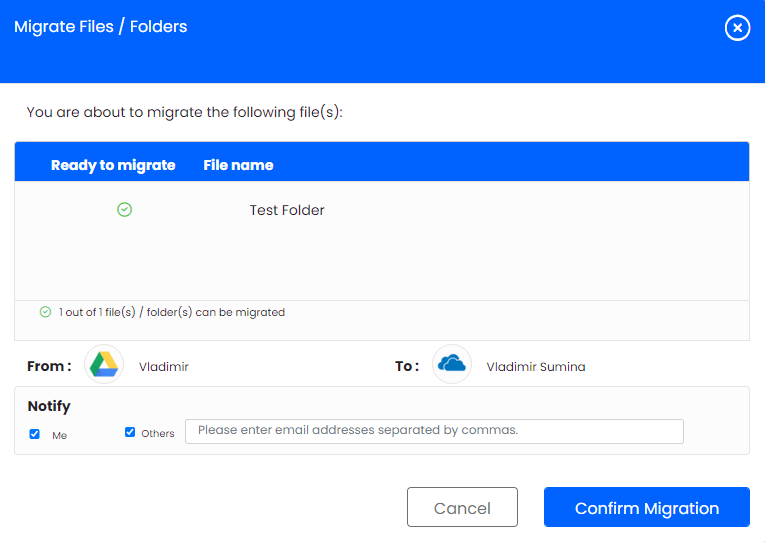
The Reporting Tool
CloudFuze has a powerful reporting tool that you can use to keep track of every process you’ve undertaken and how these have turned out. These reports tell you which data and folders were transferred or backed up from which cloud services. They also provide other important info including the size, time and if there were any conflicts between these files.

CloudFuze Team Migration Tool
To migrate your team members, you first have to connect a multi-user cloud account to CloudFuze. After that, you will have the option to also migrate user and file permission levels and their roles. However, this option is only available on the Business payment plan, which we will talk about in greater detail in the pricing part of the review.
CloudFuze Features Overview
| Features | |
|---|---|
| Free Account | |
| Max Cloud Connections | Unlimited |
| WebDAV Support | |
| FTP Support | |
| Web Interface | |
| Mobile Apps | |
| Desktop Client | |
| Upload Files | |
| Cloud-to-Cloud Transfer | |
| Cloud-to-Cloud Sync | |
| Cloud-to-Cloud Backup | |
| File Sharing | |
| Work Spaces | |
| Image Preview | |
| Document Preview | |
| Stream Media | |
| Open File in Original Service | |
| Search Files | |
| Work chat | |
| Two-Factor Authenticaion | |
| In-Transit Encryption | |
| End-to-End Encryption |
Pricing
CloudFuze has two pricing plans: Personal and Business. The Personal plan is further divided into Lite and Pro payment tiers, though both plans are a bit pricey. There is no free plan available, but CloudFuze does offer a 30-day free trial that will let you try out the service to see if you like it or not.
CloudFuze Personal Pricing Plan
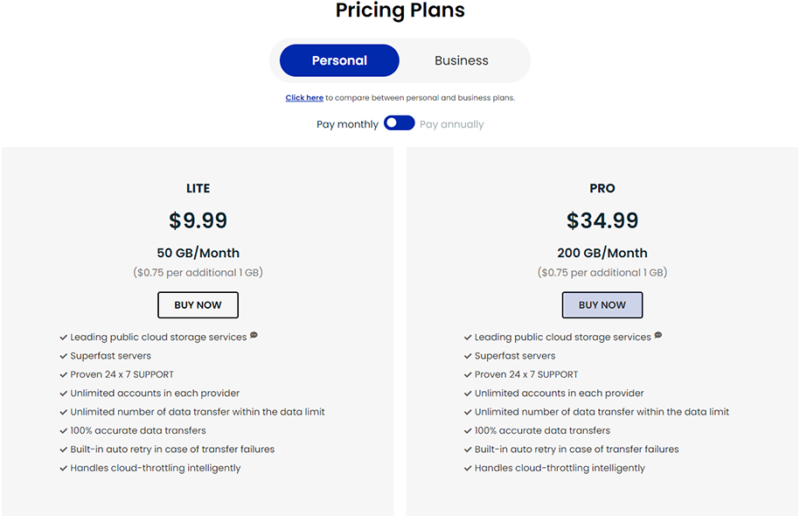
Like its name suggests, CloudFuze’s Personal payment plan is intended for individual users looking to migrate their personal data. The Lite plan costs $9.99 per month, or $99.99 on an annual plan, and it provides you with 50GB of data traffic per month. If you reach this data limit, you can purchase additional data for $0.75 per additional GB.
The Pro plan is priced at $34.99 monthly, or $349.99 annually. Compared to the Lite plan, this increase in price also comes with more data traffic: 200GB. The Personal plan lacks most of the advanced features and tools of the Business accounts and has lower priority customer support. CloudFuze doesn’t offer a refund option.
Compared to some CloudFuze alternatives, its Personal plan features feel underwhelming. For example, MultCloud’s monthly plan gives you three times the data traffic for the same price, plus all of MultCloud’s other advanced features. At $39.20 per month, CloudHQ’s Premium plan is a bit more expensive than CloudFuze’s Pro plan, but with it you have unlimited backup and sync.
CloudFuze Business Pricing Plan
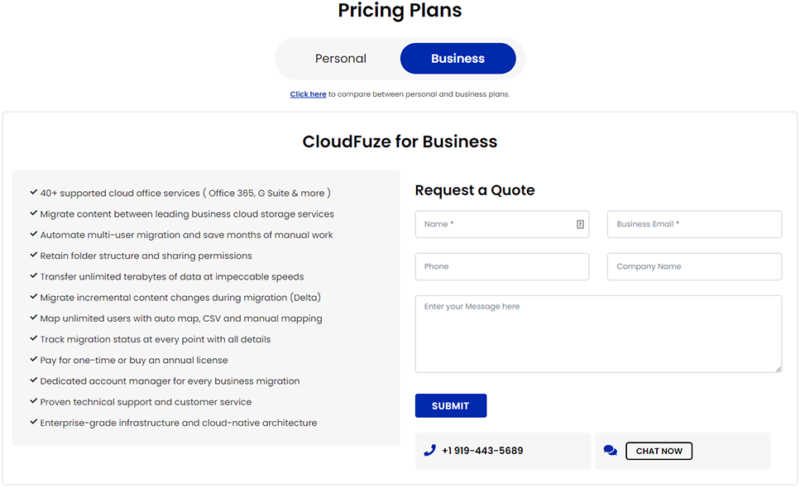
The Business plan is oriented toward large enterprises and has custom pricing. To get a price quote for your enterprise, you will have to contact CloudFuze directly. You can pay a one-time fee or buy an annual recurring license. Users on this plan will be given higher priority customer support than those on the Personal plan.
Meant for business data, it supports multi-user cloud storage services and migrates users, shared data and permissions. This plan doesn’t have data transfer limits, which means that you will be able to transfer unlimited terabytes of data at high speeds. Just like Personal users, Business users can also take advantage of CloudFuze’s 30-day free trial.
CloudFuze Free Trial
Most cloud-to-cloud management software has a free plan of some sort. Usually, this plan allows for a limited amount of data that makes the plan suitable only for personal users who want to sync and migrate their free cloud storage services. Instead of imitating its competitors and doing the same, CloudFuze forgoes this approach in favor of a 30-day free trial.
Free trial users can only migrate up to 2GB or 50 files’ worth of data during their month-long trial. This effectively means that you will only be able to tinker around in it to see how it works, but it’s still a nice — if restrictive — option that lets you try it out before committing to a paid plan.
While 2GB can seem like a meager amount of data, there are worse deals out there — cloud-to-cloud management competitor Cloudsfer has just 250MB on its free plan. If you are looking for a similar service that has a great free plan, we recommend you check out cloudHQ (you can read more about it and its attractive free option in our cloudHQ review).
- Data traffic: 50GB
- Data traffic: 200GB
Ease of Use
If there is one area that CloudFuze undoubtedly excels at, it is how easy it is to use. With a wonderfully designed user interface that highlights accessibility, it’s no surprise why it gained a spot in our list of the best cloud managers for Android.
CloudFuze is straightforward and uncomplicated. Everything is handled over its web interface; there is no mobile or desktop app. If you are looking for either of these, we suggest you check out odrive.
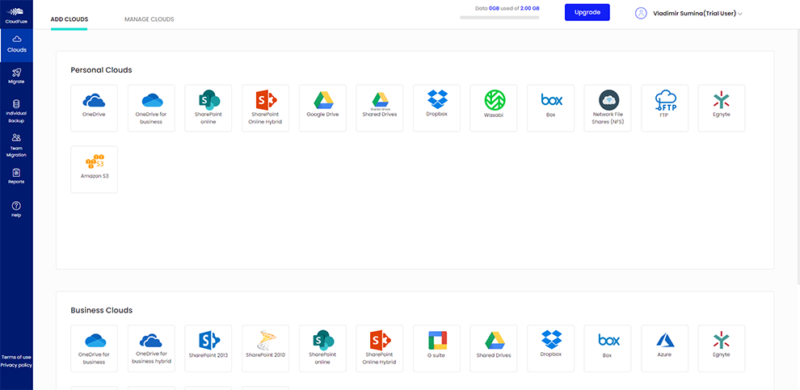
The left sidebar is reserved for your connected clouds, migration, backup and the reports tools, while the middle part of the interface is dedicated to setting up and running these processes. For example, if you go into your “manage clouds” section, you will be able to see which clouds you’ve connected and other related info, including how much storage space you have left.

However, ever since CloudFuze drastically revamped their app and design a couple of years ago, it has been streamlined toward ease of use at the cost of functionality. The file manager has been removed, and with it the option to upload, download, preview and search for files. Likewise, file sharing and creating workspaces for collaboration is also gone.
Today, CloudFuze looks better than ever before, but some of its former core functionalities have been stripped away. In effect, this leaves you with an app that now focuses solely on sync and backup relationships between cloud services, no longer giving you advanced file options and sharing capabilities.
Supported Cloud Services & Protocols
With more than 40 supported cloud services, CloudFuze can connect with most of the leading public cloud storage services, including Google Drive, OneDrive, Dropbox, as well as Amazon S3 and Wasabi, two of the best cloud computing services. Unfortunately, the WebDAV transfer protocol isn’t supported, but File Transfer Protocol is.
CloudFuze supports the following 13 personal cloud services and protocols: OneDrive, OneDrive for Business, SharePoint Online, SharePoint Online Hybrid, Google Drive, Shared Drives, Dropbox, Wasabi, Box, Network File Shares, FTP, Egnyte and Amazon S3.
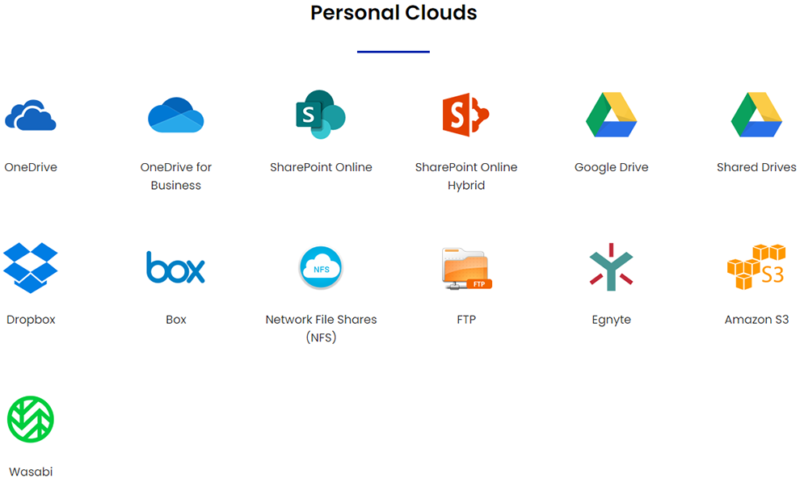
The supported cloud storage services and protocols are divided into two categories — personal clouds and business clouds. As demonstrated in our pricing section of the article, the Personal payment plan is intended for personal cloud storage services, while the Business plan is meant for business cloud services, as it can store and handle far greater amounts of data.
CloudFuze supports the following business cloud services and protocols:
OneDrive for Business, OneDrive for Business Hybrid, SharePoint 2013, SharePoint 2010, Sharepoint Online, SharePoint Online Hybrid, G Suite, Shared Drives, Dropbox, Box, Azure, Egnyte, Network File Share, CIFS, Share File for Business and Amazon S3.
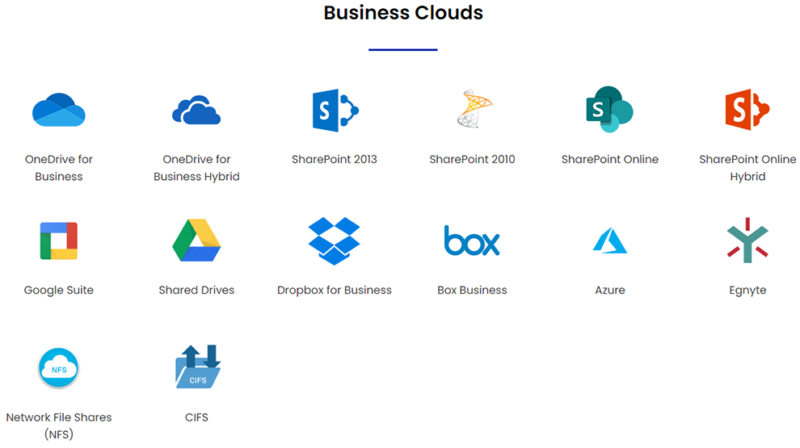
We particularly like that CloudFuze supports Egnyte Connect, which is our top pick for best enterprise file sync and share service. Having said that, there are several notable cloud services missing from CloudFuze’s support list. These include the likes of pCloud Business, Sync.com for Teams and MEGA.nz (one of our favorite free cloud storage services).
Security & Privacy
In order to connect a cloud service to CloudFuze, you first have to provide authorization information for that cloud account. There are two ways this can be done. One is through OAuth, which is an industry standard passwordless protocol. With OAuth, no sensitive information — such as your cloud storage service password or username — are shared with CloudFuze.
For services that do not have OAuth support, CloudFuze requires that you input your account credentials over its web interface and secure TLS connection. If this information needs to be stored on its site, CloudFuze encrypts it using an RSA-2048 cryptographic cipher. CloudFuze doesn’t allow outside parties any access to this data.
For its IT services, CloudFuze employs CenturyLink data centers, which are SOC 1 and SOC 2 certified. CenturyLink performs regular IT audits on its infrastructure and CloudFuze has in place a rigorous disaster recovery policy, which it frequently tests out. One security measure that CloudFuze is unfortunately lacking is two-factor authentication.
CloudFuze Privacy Policy
Regarding privacy concerns, CloudFuze guarantees that it cannot access the contents of your cloud service data and that it only needs the cloud file metadata information for the cloud migration process itself. The information CloudFuze collects from you includes your email, log file info and cookies info.
CloudFuze is based in the U.S., which doesn’t have the best cloud privacy laws. As such, your personal information can be disclosed to CloudFuze subsidiaries, affiliates and other third parties, including the United States government, and is subject to U.S. laws. You can read more about this topic in our cloud laws and regulations article.
Overall, when it comes to the privacy department, CloudFuze can certainly stand to improve. If your privacy is important to you, you should consider switching to one of the best cloud storage services in Europe, which has much better privacy laws, as well as reading through our extensive online privacy guide.
Customer Support
As we mentioned in the pricing segment, CloudFuze’s customer support depends on which pricing plan you’ve chosen. The Personal plan has general support and the Business plan is given priority support. Apart from this, every plan — including the free trial — has the same customer support options available.
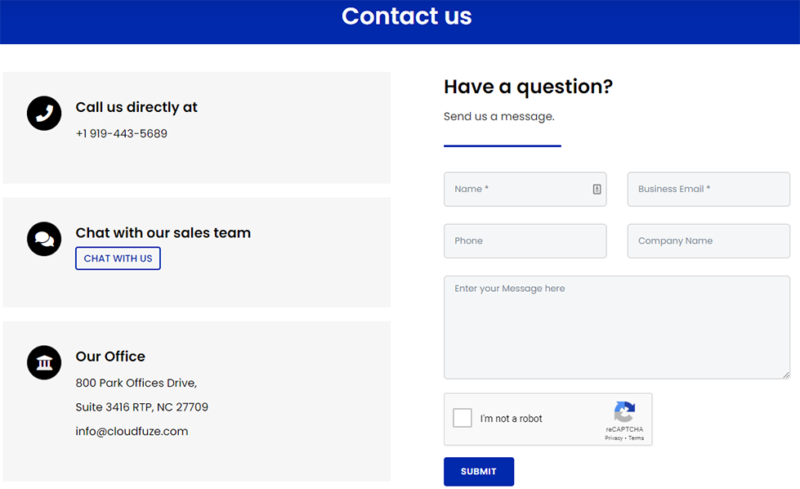
These support options include the standard phone and email, and live chat as well. The chat is available 24/5 and is an excellent way to quickly receive help and get your questions answered by a CloudFuze expert who knows the software inside and out. Without a doubt, live chat is a customer support option that we love to see in all the services we review.
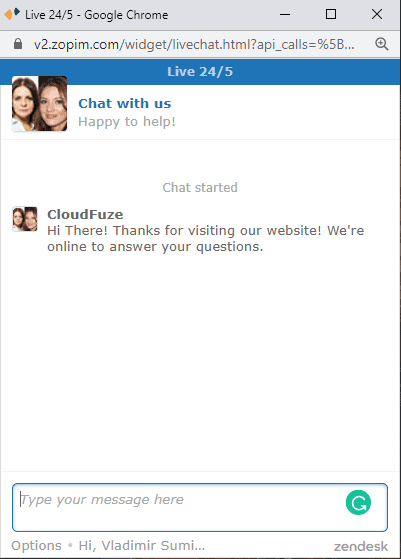
The only real downside to CloudFuze’s customer support is that its Business payment plan takes precedence over the Personal plan, but this is a common model many services employ in order to get users to subscribe to a more expensive plan. However, the live chat more than makes up for this.
The Verdict
As a cloud-to-cloud management service, CloudFuze does its job adequately, if without much pizzazz. Best used for user permission migrations in large enterprises with a lot of employees, CloudFuze only really shows its true capabilities on the Business payment plan and is much less suited for personal use.
If you’re not a business user, there’s no reason why we would recommend it over the much better and feature-rich MultCloud and cloudHQ. We hope that this CloudFuze review has helped you make an informed decision regarding whether it’s the type of cloud-to-cloud management service you are looking for.
Are you a current or past CloudFuze user? What are your experiences with this cloud-to-cloud management software? Do you agree with our review or do you think we were too harsh on it? Is there anything you think we should add? Tell us all about it in the comments below. As always, thank you for reading.
FAQ
To consolidate and better control your cloud storage accounts, you will need to use a cloud-to-cloud management service such as CloudFuze. Also known as multiple cloud storage managers, these apps allow you to connect and manage cloud storage services and their data from a single management app.
CloudFuze is cloud-to-cloud management software. With it, you can connect your cloud storage services to one another and migrate your files, file permission levels, users and user roles across multiple cloud platforms.
While there are definitely more secure cloud-to-cloud management services out there, CloudFuze isn’t unsafe to use. Your cloud storage credential information is encrypted using an RSA-2048 cryptographic cipher and housed at SOC 1 and SOC 2 certified data centers. However, where CloudFuze falls short is in its privacy policy, as it retains the right to disclose your private information to its affiliates and the United States government.

